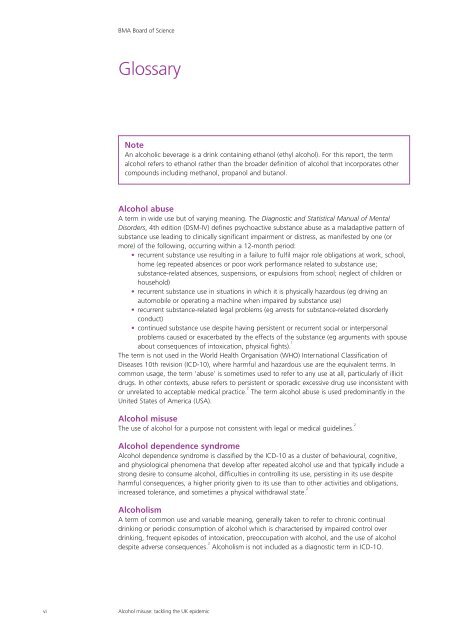Alcohol misuse: tackling the UK epidemic - London
Alcohol misuse: tackling the UK epidemic - London
Alcohol misuse: tackling the UK epidemic - London
Create successful ePaper yourself
Turn your PDF publications into a flip-book with our unique Google optimized e-Paper software.
vi<br />
BMA Board of Science<br />
Glossary<br />
Note<br />
An alcoholic beverage is a drink containing ethanol (ethyl alcohol). For this report, <strong>the</strong> term<br />
alcohol refers to ethanol ra<strong>the</strong>r than <strong>the</strong> broader definition of alcohol that incorporates o<strong>the</strong>r<br />
compounds including methanol, propanol and butanol.<br />
<strong>Alcohol</strong> abuse<br />
A term in wide use but of varying meaning. The Diagnostic and Statistical Manual of Mental<br />
Disorders, 4th edition (DSM-IV) defines psychoactive substance abuse as a maladaptive pattern of<br />
substance use leading to clinically significant impairment or distress, as manifested by one (or<br />
more) of <strong>the</strong> following, occurring within a 12-month period:<br />
recurrent substance use resulting in a failure to fulfil major role obligations at work, school,<br />
home (eg repeated absences or poor work performance related to substance use;<br />
substance-related absences, suspensions, or expulsions from school; neglect of children or<br />
household)<br />
recurrent substance use in situations in which it is physically hazardous (eg driving an<br />
automobile or operating a machine when impaired by substance use)<br />
recurrent substance-related legal problems (eg arrests for substance-related disorderly<br />
conduct)<br />
continued substance use despite having persistent or recurrent social or interpersonal<br />
problems caused or exacerbated by <strong>the</strong> effects of <strong>the</strong> substance (eg arguments with spouse<br />
about consequences of intoxication, physical fights). 1<br />
The term is not used in <strong>the</strong> World Health Organisation (WHO) International Classification of<br />
Diseases 10th revision (ICD-10), where harmful and hazardous use are <strong>the</strong> equivalent terms. In<br />
common usage, <strong>the</strong> term ‘abuse’ is sometimes used to refer to any use at all, particularly of illicit<br />
drugs. In o<strong>the</strong>r contexts, abuse refers to persistent or sporadic excessive drug use inconsistent with<br />
or unrelated to acceptable medical practice. 2<br />
The term alcohol abuse is used predominantly in <strong>the</strong><br />
United States of America (USA).<br />
<strong>Alcohol</strong> <strong>misuse</strong><br />
The use of alcohol for a purpose not consistent with legal or medical guidelines. 2<br />
<strong>Alcohol</strong> dependence syndrome<br />
<strong>Alcohol</strong> dependence syndrome is classified by <strong>the</strong> ICD-10 as a cluster of behavioural, cognitive,<br />
and physiological phenomena that develop after repeated alcohol use and that typically include a<br />
strong desire to consume alcohol, difficulties in controlling its use, persisting in its use despite<br />
harmful consequences, a higher priority given to its use than to o<strong>the</strong>r activities and obligations,<br />
increased tolerance, and sometimes a physical withdrawal state. 2<br />
<strong>Alcohol</strong>ism<br />
A term of common use and variable meaning, generally taken to refer to chronic continual<br />
drinking or periodic consumption of alcohol which is characterised by impaired control over<br />
drinking, frequent episodes of intoxication, preoccupation with alcohol, and <strong>the</strong> use of alcohol<br />
despite adverse consequences. 2<br />
<strong>Alcohol</strong>ism is not included as a diagnostic term in ICD-1O.<br />
<strong>Alcohol</strong> <strong>misuse</strong>: <strong>tackling</strong> <strong>the</strong> <strong>UK</strong> <strong>epidemic</strong>
















